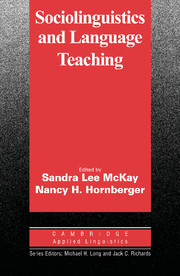Book contents
- Frontmatter
- Contents
- List of contributors
- Series editors' preface
- Preface
- Acknowledgements
- Part I LANGUAGE AND SOCIETY
- Part II LANGUAGE AND VARIATION
- Part III LANGUAGE AND INTERACTION
- Part IV LANGUAGE AND CULTURE
- 11 The ethnography of communication
- 12 Speech acts
- 13 Literacy and literacies
- CONCLUSION
- Index
12 - Speech acts
Published online by Cambridge University Press: 22 July 2009
- Frontmatter
- Contents
- List of contributors
- Series editors' preface
- Preface
- Acknowledgements
- Part I LANGUAGE AND SOCIETY
- Part II LANGUAGE AND VARIATION
- Part III LANGUAGE AND INTERACTION
- Part IV LANGUAGE AND CULTURE
- 11 The ethnography of communication
- 12 Speech acts
- 13 Literacy and literacies
- CONCLUSION
- Index
Summary
“Sorry about that!” may serve as an adequate apology in some situations. In others it may be perceived as a rude, even arrogant, nonapology. In yet other situations, it may not even be intended as an apology in the first place. Hence, it has become increasingly clear that the teaching of second language words and phrases isolated from their sociocultural context may lead to the production of linguistic curiosities which do not achieve their communicative purposes. Given this reality, second language teachers may well find that an understanding of speech act theory and practice will improve their ability to prepare their learners to meet the challenge of producing more contextually appropriate speech in the target language.
Speech act behavior constitutes an area of continual concern for language learners since they are repeatedly faced with the need to utilize speech acts such as complaints, apologies, requests, and refusals, each of which can be realized by means of a host of potential strategies. Although no course of instruction could possibly furnish all the insights that a foreign language learner would need in order to successfully finetune each and every speech act utterance, there is some evidence that furnishing learners with selected insights regarding the comprehension and production of speech acts may provide them with valuable information that they would probably not acquire on their own.
This chapter will first define speech acts and provide a brief overview of how this field of discourse has been applied to second language acquisition (SLA).
- Type
- Chapter
- Information
- Sociolinguistics and Language Teaching , pp. 383 - 420Publisher: Cambridge University PressPrint publication year: 1995
- 21
- Cited by

